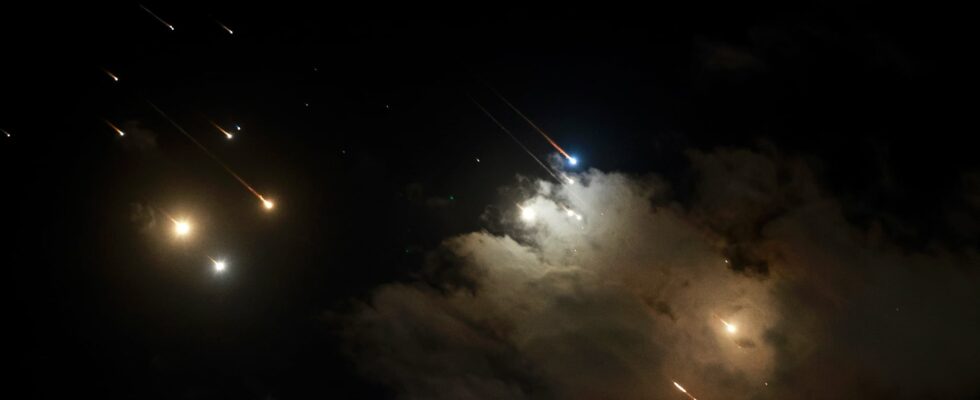It was barely 5 p.m. on Tuesday October 1 when the United States alerted the Jewish state: an Iranian attack was “imminent”. A few minutes later, the Israeli army confirms and prepares its population. The offensive by the mullahs’ regime could well be “large-scale”, indicates the IDF, whose spokesperson assures in a televised message that it is following “the threat seriously”. At the same time, the United States Embassy in Israel is ordering its employees and their family members to go to shelters. Quickly, the warning sirens go off. First in the center of the country, before spreading to the entire Hebrew territory and the West Bank.
On their smartphones, Israelis receive a message. This is from the Israeli Home Front Command and reads: “Emergency Alert: Extreme. You must immediately enter the protected area and remain there until you receive a new message.” Thus, with a lump in their stomach and under the deafening noise of the first explosions, Israeli civilians rushed to find shelter. The lucky ones lock themselves in the bunkers. The others hide behind anything that could protect them from projectile fragments.
No Israeli casualties
As a rain of missiles prepares to fall on the Jewish state, Joe Biden orders the American army “to help Israel defend itself”. At the end of the day, the first Iranian missiles were fired towards Israel. In Jerusalem and Tel Aviv, several explosions rang out. Then everything happens very quickly. Ten, fifty, then a hundred. Once the offensive was over, Israel counted some 180 missiles launched against its territory. Tehran for its part swears to have sent 200. No matter, since a large number were intercepted by the famous “Iron Dome”, this Israeli anti-missile shield, the incarnation of the jewel of Israeli military defense used to counter the projectiles of short and medium range (rockets, artillery shells).
And while the IDF assures that Iran was seeking to “kill thousands of civilians” through its offensive, the authorities have so far not reported any Israeli casualties. Only one Palestinian, from Jericho in the West Bank, died after being hit by a projectile following an Iranian strike. Also, on Tuesday evening, the White House presented the Iranian attack against Israel as “ineffective”. This, however, did not prevent the American Secretary of State, Antony Blinken, from judging Iran’s show of force “to be totally unacceptable”.
Threats of reprisals
Later in the evening, the tone rose a notch when the State Department spokesperson suggested that reprisals would indeed take place. “Of course, this attack must have consequences for Iran. I am not going to dwell on these consequences today, but there are things on which we will coordinate with our Israeli counterparts,” argued Matthew Miller in the wake of Israeli Prime Minister Benjamin Netanyahu who openly threatens Tehran: “Iran made a serious mistake this evening [hier, NDLR] and will pay the price.” And to add: “We will stick to what we have set: whoever attacks us, we attack.”
Warnings which provoked the ire of the Mullahs’ regime which congratulated itself on Tuesday evening for having avenged the deaths of the leaders of Hamas and Hezbollah while having “respected the standards” of international law. Thus, on Wednesday morning, Tehran “warned” the United States against any form of intention in support of their ally at the risk of having to face “a severe response”. On state television, the chief of staff of the Iranian army even said he was ready to strike “all the infrastructures” of the Hebrew state “if the Zionist regime […]“continued “its crimes” or “continued to act against our sovereignty or territorial integrity”.
The specter of regional conflict draws closer
Around the world, Tuesday night’s escalation only heightened fears of widespread war in the Middle East. In France, Emmanuel Macron “condemned with the greatest firmness the new attacks by Iran against Israel”. Same story in London, where Prime Minister Keir Starmer reiterated the United Kingdom’s “firm commitment” to the security of Israel. For his part, the head of the Spanish government Pedro Sanchez urged Iran and Israel to put an end to “the spiral of violence” which is engulfing the region.
The head of the UN, Antonio Guterres, for his part limited himself to condemning “the widening of the conflict in the Middle East” without specifically condemning the Iranian offensive. Which earned him to be declared “persona non grata” on the soil of the Hebrew State.
